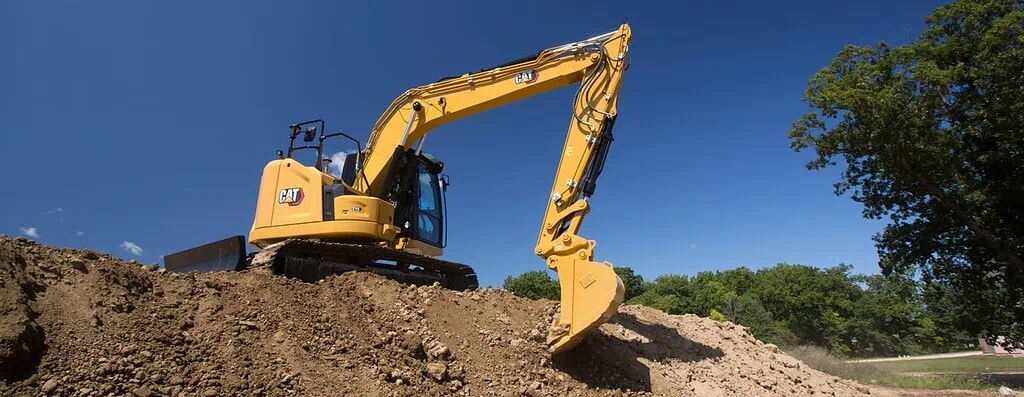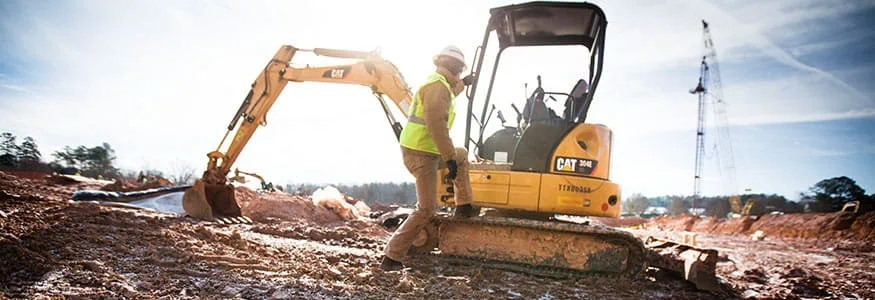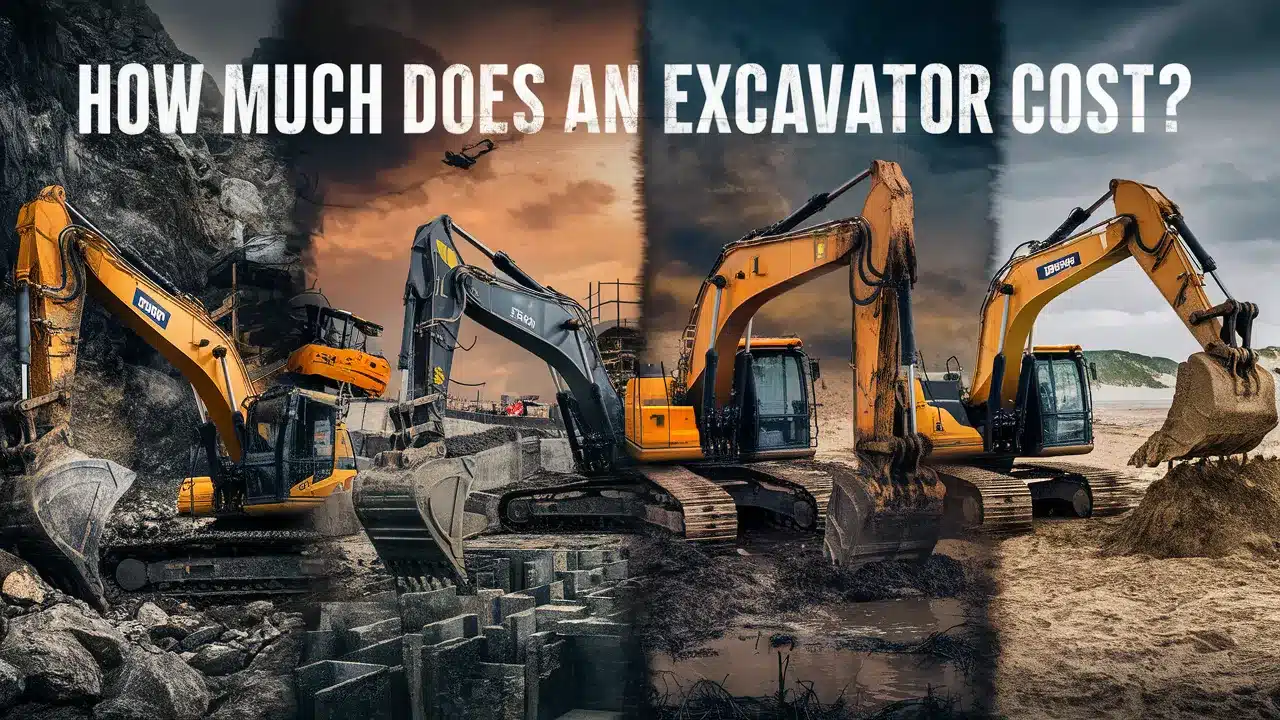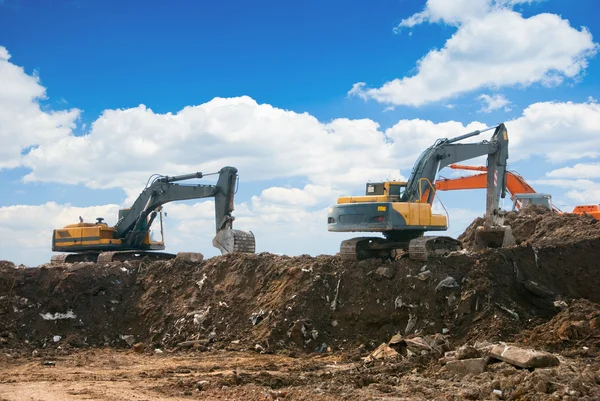If you don’t maintain excavator, it will cost you in downtime, repairs, and a shortened life for your machine. If you maintain your excavator, you can make it last a long time, run well, save money in the long run, and be the reliable machine you need it to be.
Excavator maintenance is essential for prolonging machine life, improving performance, and avoiding costly repairs. Focus on daily and weekly inspections, prioritize critical components like hydraulic systems and engines, and keep detailed records of maintenance activities. Avoid common mistakes like overloading or neglecting minor issues. Operator training and seasonal adjustments can also enhance reliability and efficiency.
Let’s dive into the most frequently asked questions about حفارة maintian and explore actionable steps to keep your machine in top condition.

جدول المحتويات
تبديلWhy Should You Maintain Your Excavator Regularly?
Keeping up with maintenance on your excavator is a good idea for a few different reasons. Short-term, performing daily and scheduled maintenance will help your excavator perform without any hiccups, allowing you to complete your job on time and as efficiently as possible. Long-term, a well-maintained machine will use less fuel because all the components are up to snuff, which means it will cost you less in the long run.
Oh yeah, and safety. You know, if your brakes go out and your hydraulic lines are so loose they could whip out a news cameraman, maintaining your excavator will keep you from killing yourself or someone else on a job site. Enough of a good reason for you? Also, keeping up with scheduled maintenance is a good way to stay compliant with safety and environmental laws. Don’t be surprised if the clean air folks want to see your maintenance logs to make sure you’re not pouring out a black cloud of death every time you crank up Mean Mary.
Missing maintenance has bigger financial implications, too. Skipping repairs and parts replacement can lead to catastrophic failure, which is a fancy way of saying you have to replace the whole dadgum thing sooner than you’d like. Taking good care of your excavator will help you keep the total cost of ownership (TCO) down over time because you can make that sumbitch last forever if you take care of it.
What Are the Risks of Neglecting Excavator Maintenance?
There is a litany of expensive and sometimes dangerous problems that can arise from not maintaining your machine. For instance, if you neglect regular oil changes, your engine can overheat or even lock up, which can lead to a very expensive repair. Or, if you don’t keep an eye on your hydraulic lines, one of them could burst and you could spring a hydraulic fluid leak that renders your machine useless, plus it’s expensive to fix it.
The other problem with not keeping up with maintenance is unplanned downtime. If your excavator breaks down when you’re in the middle of a project, there can be associated penalties for not completing on time, or you might even lose out on work. You don’t want your machine going down at any time, but especially not during peak construction times.
Safety is another big reason. Faulty brakes on a haul truck or an unstable boom on your excavator can lead to accidents, which can be costly, both from a personal injury standpoint and in terms of legal ramifications if you or someone else gets hurt.

Which Components Require the Most Attention During Maintenance?
Focusing on key components will get you the best return on your maintenance investment. The hydraulic system is the heart of your excavator, so you should constantly check hydraulic hoses, seals, and fluid levels. Any leaks or contamination can be disastrous for your equipment. The engine is equally important. Keep an eye on oil levels, replace the oil filter and clean or replace air filters as necessary. Lastly, keep an eye out for overheating or unusual noises in the engine.
The undercarriage needs constant attention because it supports the weight of the entire excavator. Keep it clean and adjust track tension regularly. This is crucial because the tracks, rollers, and sprockets receive quite a bit of wear and tear, especially if you’re regularly working in rough or uneven terrain.
Also, don’t forget to keep an eye on electrical components like the battery, wiring, and lights. A weak battery or corroded connections can lead to starting issues in a hurry. Plus, if you don’t pay attention to the lights, you could find yourself in hot water with OSHA if someone gets hurt because they couldn’t see at night.
How Can You Perform a Daily Excavator Inspection?
You can do a thorough daily inspection in less than 15 minutes, and it’s worth every second. Start by walking around the machine and looking for visible damage, leaks, or loose parts. Pay special attention to the undercarriage. Clean out any debris trapped in the tracks and make sure the tracks have the proper tension.
Next, check all of your fluid levels like engine oil, hydraulic fluid and coolant, and top them off if necessary. Check the boom and arm for cracks, rust, or any signs of stress. Also check to make sure all your attachment pins and bolts are secure.
Start up the engine and listen for any unusual sounds like knocking or a whistle, which is a bad sign. Test all your controls to make sure they respond smoothly. Finally, check safety features like the brakes and warning lights to make sure they’re operating properly.

What Should Be Included in a Weekly Maintenance Schedule?
Weekly maintenance checks are more comprehensive than daily checks. First, inspect and clean your air filters. A clogged air filter will reduce efficiency and can lead to your engine overheating. Grease all lubrication points to reduce wear on all moving parts.
Pay particular attention to your hydraulic system during your weekly checks. Check the hydraulic fluid for signs of contamination or general mucking up, and look for small cracks or leaks in the lines. Hydraulic oil leaks are a great way to piss away a lot of money in a hurry. Tighten any hoses or fittings that have come loose during operation. Also, check the battery terminals for corrosion and make sure they’re tightly attached.
While you’re in the neighborhood, look at the belts and hoses to make sure they’re not worn or fraying. Check and tighten any bolts or fasteners that may have come loose with all the bouncing around your machine does. When you’re thoroughly cleaning your machine, look over every inch of it for signs of any problems like rust or structural cracks.
How Do Seasonal Changes Impact Excavator Maintenance?
Cold weather comes with its own set of challenges. Lubricants and hydraulic fluids thicken and don’t flow as well when they’re cold. If you keep running equipment that’s not up to temperature, you risk doing damage. Make sure you switch over to the appropriate fluids for the season, and give your equipment the proper amount of time to warm up before you ask it to start moving dirt.
If you live and work in a hotter climate, you have to constantly be on the lookout for overheating. Clean your cooling systems, radiators, and fans as part of regular equipment maintenance. You should also make sure your electrical components are protected from water and humidity, particularly during wet seasons. Finally, make sure you’re inspecting seals regularly to make sure you’re not introducing water to any places that are likely to be problematic.
When you’re shutting down your equipment for the off-season, thoroughly clean it, lube it well, and protect it from the elements (rust, mostly). Doing a little extra for your equipment during the off-season, or when it’s especially hot or cold, can go a long way toward extending the life of your equipment.

What Are the Most Common Maintenance Mistakes to Avoid?
Using the wrong fluids or the wrong parts is a big one. Let me give you an example. Let’s say you use the wrong hydraulic oil in your excavator. Most manufacturers recommend a specific type of hydraulic fluid. Grabbing some generic hydraulic oil (or a fluid that hasn’t necessarily been approved for use) and throwing it in your system with the best of intentions can lead to contamination and system failures. It’ll cost you way more in the long run to fix it than it would’ve cost to just do it right the first time.
Overloading your equipment is another common mistake. Every machine has a chart that shows you what it’s capable of lifting and what it’s not. If you hook something up that’s too heavy, you’re just asking to wreck your machine. You’ll put unnecessary strain on the boom, arm, hydraulic system, and everything else, and you’ll wear it out that much faster.
A mistake a lot of people make on their excavators (or any tracked machine) is not paying attention to the undercarriage. If you don’t keep it clean, the dirt and debris will build up in the tracks, getting them out of alignment and tearing things up before you know what happened. Also, ignoring small leaks or cracks in hoses or lines can lead to big money going out the door faster than a screen door on a battleship.
How Can Maintenance Records Help Improve Excavator Efficiency?
Keep detailed maintenance records on your excavators (or any equipment) will help you manage the efficiency of your machine. By documenting all your service, repairs, and inspections, you can identify any issues that keep popping up, correct them, and keep it from happening again. These records also allow you to keep track of your proactive maintenance schedule so that you don’t have a breakdown on one of your jobsites.
If a specific part keeps letting go on you, you’ve got the data in your records to prove it, and you can work to correct the cause of that specification failure. Honestly, good maintenance records make your warranty claims less painful because you’ve got proof of your proper care of your machine should something let go.
Over the long haul, good maintenance records increase the resale value of your machine when it comes time to send it down the road. A digital record-keeping system makes this a lot easier and more efficient by providing reminders of, and easy access to, historical maintenance data.
What Is the Role of Operator Training in Excavator Maintenance?
People don’t think about operator training when they talk about maintaining a piece of equipment like this, but they should. A well-trained operator is like an extra set of eyes, and sometimes that’s exactly what you need. An experienced operator knows their machine and can identify when things don’t sound right. They feel even the slightest vibration or reverberation coming through the frame. They can spot a leak from a mile away and know what to do about it.
Operator training is also going to teach them how to use their machine correctly. A poorly trained operator not only won’t be as efficient at their job, but they’re also probably going to chew up your machine doing it. Take a guy who hasn’t been trained and you’re likely to see him trying to carry a load that’s too heavy and causing unnecessary strain on the boom and arm. Someone who’s been trained knows how to carry a load correctly in order to save wear and tear on the machine.
On top of all that, a well-trained operator knows how to do the basic things like checking their fluid levels before they fire their machine up. They understand the importance of keeping their machine clean, and they do their part as far as overall maintenance goes. It’s a company’s job to invest in the training of their people. Doing so not only makes them safer and more efficient, but it also helps ensure they’ll make your equipment last as long as possible.

When Should You Seek Professional Help for Excavator Maintenance?
While you can take care of a lot of the routine maintenance yourself, there will be times when you need to call in a professional to help you out. For instance, you probably aren’t equipped to tackle a complete overhaul of your hydraulic system if it goes belly up on you. You’re going to need someone with the skills, knowledge, and equipment to do your work for you in that circumstance. When your engine goes down, it’s best to trust the professionals as well.
A trained professional can do a comprehensive diagnostic check that will help identify problems with your equipment that you can’t see with the naked eye. Plus, they can make sure they’ve got your machine running the way it should be running.
In addition to calling in the pros for help with fixing something when it breaks, it’s a good idea to have a pro give your equipment regular check-ups. Some problems are going to be tough for you to identify with your daily and weekly checks, especially if it’s a problem internal to a component like a pump or a bearing. You’ll need a pro who does that sort of thing day in and day out to keep an eye on things for you.
For what it’s worth, some shops that are authorized to do work for specific manufacturers are also going to be the only ones who can do work for you and keep your warranty in place. In a nutshell, don’t be afraid to call in the pros, especially when it’s going to save you downtime and headaches later on.
How Can Technology Enhance Maintain Excavator?
Two big technological advances have made maintaining your حفارة a whole lot easier. First, telematics systems are a game-changer when it comes to keeping an eye on your baby. Telematics systems monitor all the important stuff like fuel efficiency, hydraulic pressure, engine temperature, and a bunch of other things that I don’t have time to tell you about.
When something goes wrong (or something’s about to go wrong), you get an alert sent to you (or your fleet manager) before you have a major issue with your machine. With the right telematics systems, you can know about a problem with your machine, or even just a potential problem with your machine, before you even know there’s an issue.
AI (artificial intelligence) driven predictive maintenance is another technological advance that’s a big old fat game changer in the maintenance world. Companies that are worth way more money than me have AI algorithms that can analyze historical data to forecast when a component on your machine is likely to fail. If, say, the pump on your excavator is supposed to let go in a week, no problem. The AI system will know that and let you know all about it so you can fix it before you ruin a week’s worth of jobs, and it reduces that status of having to replace the pump as well.
Don’t forget your mobile app for maintenance (or cloud-based platform* if that’s your bag). Folks have made some really cool apps that let you manage your maintenance from the palm of your hand. You can log activities, get caught up on any upcoming maintenance you need to do, and even look at troubleshooting guides all from your mobile device. Cloud for those companies who don’t want to see IT as a bad word.

ملخص
Therefore, it is important to perform regular maintenance to ensure your excavator is always as productive, safe, and cost-efficient as possible. By knowing your excavator’s needs and addressing them daily, weekly, monthly, quarterly or yearly, you can save yourself costly breakdowns, extend the life of the machine, and improve its resale value when it comes time to upgrade. Avoid the common mistakes, keep great records, train your operator, and don’t be afraid to pick up the phone and call for help when necessary. By following these best practices, your excavator will continue to make you money and save you money for years to come. For more information or professional advice, feel free to contact us.








